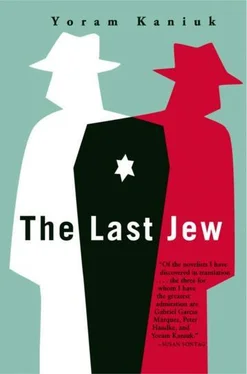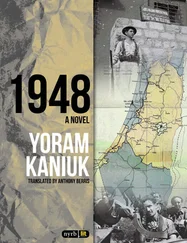All my life I was a rational man. A realist-Zionist, as Demuasz used to put it enthusiastically, the infidel shall live by his faith. Pascal's statement that the heart has reasons that reason does not know was just as alien to me as Kafka's stories. But ever since the disaster, I have clung more and more to nonrational contexts. An amazing idea rose in my mind: the German will surely explain to me what my neighbor said and that thought infuriated me very much and also excited me. Everything was so unexpected for Henkin, who had done the same things all his life, loved one woman, one son, one house, one land, one language, one dream, taken the same route every single morning, hundreds of times, read one chapter of the Bible and one legend from the book of legends of Bialik and Ravnitsky and suddenly the reason that reason doesn't know… So I tried to put into my stance a pride he had robbed from me. A right I had toiled to cultivate, as my wife says, my right to suffer. The water returned to the hose, I thought about his semicolon, the semicolon between the last words, and because of that a current of electricity passed through my spine, a semicolon I once tried to teach my students and I became absurd to them. I thought about my wife who despises me now when she maybe gets up from the toilet we put in years ago and isn't white anymore, yellow and bluish snakes creep on its sides, I thought of Menahem who would sit on the toilet or as Amihud Giladi said when he used to come visit me: The toilet Menahem learned to masturbate on and I then pretended not to understand, and Amihud said: He taught me to masturbate, and I tried to imagine my son masturbating in the toilet, I, who dreaded the very thought of it. I thought of Menahem, pushing a wheelbarrow, saying, Here's the train with a cold bringing red loam, and then masturbating with Amihud, maybe that's the answer to the daughters of that neighbor who suddenly have a garden of their own?! My thoughts, like my torments, are overcultivated. And suddenly some response to my neighbor standing there waiting for his daughters bursts in me and illuminates my pain in a wretched light, so righteous is he there facing me, facing me in the righteousness of his no-daughters and I think about the one who from now on I'll secretly call Germanwriter, what I'll say to him, how I'll talk with him, the bereaved father once again brought me very low, that homonym, member of the Committee of Bereaved Parents, who doesn't laugh when Jordana of the Ministry of Defense chews plastic vegetables mistakenly or not. I always measure dimensions by nondimensions. In the newspaper I first pause at announcements, Yoram and Hannah Tsipori are pleased to announce the birth of their daughter Liat, and I loathe with unbridled loathing the grandchildren born to children who were even younger than Menahem and I see my neighbor, yearning for his daughters, he didn't mention a number, but more than one, with that hose of his in the light of sunset that already falls more than descends, what is it to lose daughters, two, three daughters? A picture rises in my mind, I teach Hebrew grammar, Teacher Sarakh knocks on the door, the picture of King George behind my back, covered with fly droppings, the war of Teacher Henkin against the British Empire and in our school, we also sang Hatikvah as if it was a ritual of taking an oath to the Bar Kokhba Uprising, we even had a socialist tendency some nationalist touch, the hands in the classroom go up to answer a question and Teacher Sarakh knocks and I open the door and see a hand holding an ear and the ear is stuck to a body and the body is the body of Menahem, and it's burning with awful anger, he broke hangers, your son! And I have to lock the door immediately so the students won't see, ostensibly quiet and restrained, inside me hums the strict father I have to play, as always, bereaved father, nationalist father, resurrecter of gardens, and my son stands there, his ear in the hand of Teacher Sarakh, a smile on his face and she's shaking, You're merciful with him, she says, I remember the word merciful, like a gracious lord, and that hatred of hers, for me, for Menahem who broke her hangers, he broke more of mine but I'm still silent, her anger from the days when we all met on the Tiberias-Tsemakh road and she and Hasha Masha quarried stones and I came to work and at night I lectured on Hebrew poetry and I taught Hebrew to those pioneer men and women, and she wanted Menahem to be hers and I wanted Hasha Masha for a wife, and not her, even though she was so educated and knew Rosa Luxembourg and they said that Trotsky had embraced her for three nights in a row and then was captured, and she walked on foot from Russia to Turkey and from there sailed in a ship to the Land of Israel and here I come, teaching, talking, hewing words in the glowing air of the Galilean nights, and I don't have a Menahem for her, I knew only one woman, and her eyes were full of doves that flew off and didn't return. And I told her: Not hangers, coat hangers, and she wanted to be choked or to choke because for such sad and loyal barbarian women it's all the same, hangers, coat hangers, what difference does it make, but back then precision was important to me, my neighbor is waiting, why is he waiting, I don't have any daughters for him. I then took my son to Demuasz and said Demuasz, here's Menahem, who broke coat hangers in the hall. And he repressed a smile and asked why did you break hangers, Menahem, and Menahem said that they were there and blocked his view of the wall. And I, I corrected him there, I said, the coat hangers blocked you, and Teacher Sarakh looked at me both excited and frightening, and I think of the grammar as her weary face of the shout, how it shouts or weeps in correct grammar. Today I know that what is written has to be written despite grammar and not because of it, Menahem died with all the tables of tenses and verbs, pain isn't measured in commas, but my neighbor's semicolon was so precise, only a tongue can be precise like that, can describe something that's both awful and precise and so even scarier than the thing itself… And she waits there, Sarakh, for me to punish him, she wants to see the whipping, the gallows, only when she sees the blood of one who could have been her son will she calm down, understand the precise meaning of the flydroppings on the face of King George. And then they demoted Menahem to a lower class for a week, and he sat next to a little girl and pinched her, maybe he was looking for her breasts and pinched her behind. A shriek rose and they called us, and Menahem's mother said: You go, you're the pedagogue, not me, and I went and the parents of the little girl, I even remember her name, Hedda Topolovsky, her father it seems to me rolled cigars and her mother, her mother I don't remember, maybe she worked for him as a model, I'm starting to be ironic in old age. And that Mrs. Hedda Topolovsky, what's she doing today, the little girl my son pinched, maybe she runs the branch of the Merry Wives of Windsor in Haifa, or maybe she teaches in the school for the blind or maybe she's a high-priced whore, she's surely alive, the poor girl he pinched and maybe she hasn't recovered since then and searches for Menahem in dark corners, in luxury cars she rides in with her splendid pink behind, and surely all those little girls that I to my distress was the first to discover their breasts even before the boys hit their backs as evidence of the new bras they wore, every one of them had a pink behind in their youth and later they grew and the pinkness disappeared, and they don't have Menahem in the streets where their behinds rustle in pink panties instead of the behinds that turn white and yellow with the years and they say: Hello, Teacher Henkin, and I know them but their names I don't know and what difference does it make now, their names they sold for some name of a husband that Menahem could have been or not, hangers, coat hangers… Maybe they get into them all their lives with coat hangers, without coat hangers, all the officers, all the criminals that filled our land, and Teacher Sarakh, with legs that swelled up on the way from Siberia to the Land of Israel, hit the soldiers entering into the pink behinds to defend her from Menahem who could have been her dead stepson and not the son of Hasha Masha and then I scolded my son, stubborn and rebellious son I said, but deep inside me I tried to defend him, I knew I was a sinner… Why, Hasha Masha, why didn't you see how I tried to defend your son even then, when I was busy educating many generations for the state in the making?
Читать дальше












